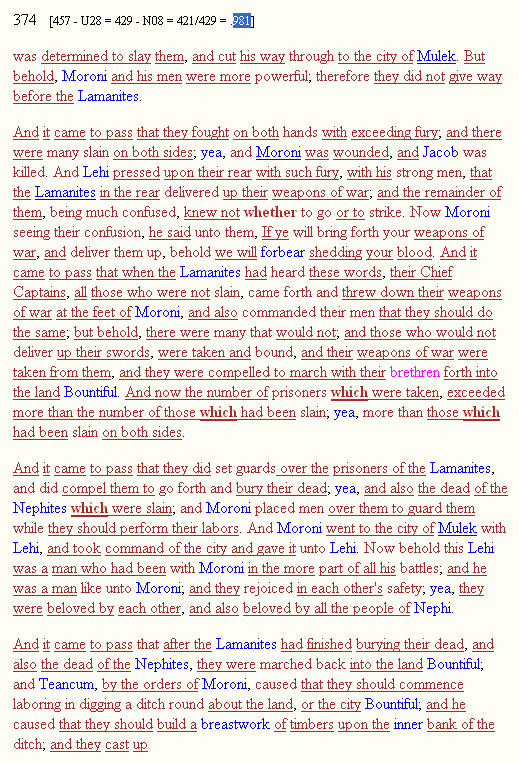Brent Metcalfe wrote:Hi Dale,
Before I doze off, let me recommend that you read my essay:
B. Metcalfe, “The Priority of Mosiah: A Prelude to Book of Mormon Exegesis,” New Approaches to the Book of Mormon: Explorations in Critical Methodology, B. Metcalfe, ed. (Salt Lake City: Signature Books, 1993), 395–444 (see especially 408–415 where I discuss the therefore > wherefore lexical shift in considerable detail)
I simply don’t have the time (nor the inclination) to restate what has already been in print for well over a decade.
My best,
Brent
Yes -- I have that right here in front of me while I'm responding to you. To me it looks like a case for redaction
by a final editor of the text, but evidently you see it as an argument for a homogeneous, non-composite text.
That is about as far as I can go, unless you tell me what else to look for.
Once again, my purpose is to determine whether the Book of Mormon is internally consistent and the product of a single writer
(as Dan seems to argue) -- or whether there is a possibility that it contains embedded source material.
You can pretty much answer my question with a "yes" or "no," and the discussion can move on to other matters.
I'll paste in below some more documentation of page 374 in the 1830 Book of Mormon:

The above image is a screen shot of the page 374 URL I provided earlier in this thread. The highlighted .981"
at the top of the page is the 98.1% overlap with Spalding's "Oberlin MS" vocabulary (highlighted in brown text).
The brown underlinings are some word-strings found in both the Book of Mormon and Spalding.

The next graphic is a small excerpt from my 1830 Book of Mormon chart, comparing the text to Spalding vocabulary and
non-contxtual word markers.
As can be seen in the bottom bar graph, the non-contextual word indications rise continually through 1830 Book of Mormon
Ch. XXIV, and then drop off suddenly near the end of that chapter.
As can be seen in the coordinated top line graph, the 1830 Book of Mormon Ch. XXIV vocabulary overlap rises on a similar
slope and then suddenly drops off after page 374 (near the end of that chapter).
Consulting my previously linked scans of the modern LDS Book of Mormon pages 330-331 (which are roughly the same as
the 1830 page 374-375), it can be seen that phraseology overlap between the two texts (red underlines) remains
high through the end of the modern LDS Ch. 53, but then suffers a sudden drop-off a few sentences of the chapter
break (on LDS page 333).
http://solomonspalding.com/SRP/MEDIA/P4/330.JPG
http://solomonspalding.com/SRP/MEDIA/P4/332.JPG
As though anticipating this coming change, the text at the end of LDS Cg. 53 contains some anomalies at
LDS 53:2, 53:9-10, 53:15 and 53:21. These passages aree so unlike the surrouding test, that they evidently impose
a severe change upon both the vocabulary overlap and the non-contextual word markers.
In other words, although Spaldingish phraseology continues through the end of LDS Ch. 53, changes in the text
begin to make it far less Spaldingish than it had been a couple of pages below.
For three different reasons (vocabulary, phraseology and non-contextual words markers) I see what had been
a very highly corresponding Book of Mormon narrative very quickly lose its previous correspondence with Spalding right
around the chapter break.
This indicates (to me at least) a literary transition from one writer to another, though the break is not a sharp one.
I credit most of the 1830 Ch XXIV (LDS 52 & 53) to Spalding, but with a transition near the end to another writer
or editor's voice.
So far, in my charting of the 1830 Book of Mormon text, page 374 bears the highest similarity with Spalding's known writings.
I therefore cite it as a "benchmark" by which I compare and categorize other 1830 Book of Mormon pages as being "high,"
"moderate," or "low" in their similarity to Spalding.
Dale

